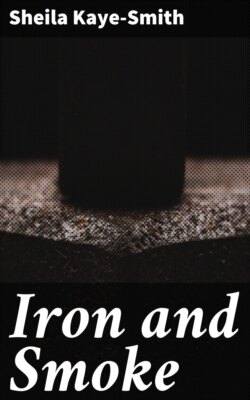Читать книгу Iron and Smoke - Sheila Kaye-Smith - Страница 10
На сайте Литреса книга снята с продажи.
§7
ОглавлениеTable of Contents
At the end of half an hour Timothy suddenly appeared round the swell of Freeboro’. He had evidently not expected to find the lovers seated in the foreground of his favourite view, and was going away when they both called him.
“Mother’s fallen asleep,” he said as he joined them, “and I came to have a look at the sea.”
“You get a fine view of it here—if it wasn’t for the smoke.”
“Yes, Carlingrove’s no ornament—and yet I’ve somehow got so used to it there in the middle of the view, that I believe I’d miss it if it disappeared, though I’m sure I hope it will.”
“That isn’t the right state of mind for the future head of Bastow, Routh and Partners. You should be looking forward to your works spoiling the view of the Last Judgment.”
“It’s like the Last Judgment already inside. Have you ever been over any iron-works?”
“None except the remains of those we have in Sussex. There’s a quarry on my land where we still dig clinkers out for the roads.”
“I’ve heard of Sussex iron, but I never knew it meant much.”
“Five hundred years ago Sussex was the Black Country. My own folk made their money and got their land through iron. Queen Elizabeth gave Aubrey Mallard the manor of Herringdales in recognition of his skill as an iron-master, and Charles I made his son a baronet because he helped the Royalists with mortars and cannon.”
“Is there nothing of the iron trade left?”
“Nothing but the names; you get them all round Heathfield—Cinder Hill and Furnace Field and Iron Latch and lots of others—and there’s Pigstone and Clappers where the Mallard forges used to be. A wood near Herringdales is known as Towncreep, and the legend runs that a town is buried there like Pompeii—an iron-workers’ town which stood there before the Normans came. The Normans were inferior ironworkers to the Saxons—they couldn’t burn their clinkers out so well. But the works went on till the woods were nearly all burned up for the forges, and of course when the big coal industry started in the North it did for the wood-burning South.”
“A good thing too—for the South.”
“Your father’s son thinks that?”
“Oh, I dunno. I suppose not really. But sometimes I feel that agriculture’s a better idea than mining—improving the earth’s surface rather than digging into her vitals.”
“The rape of Demeter?”
“That’s it. And it seems to me as if it had brought us our judgment. While man remains a husbandman he is content, but when he digs for iron or coal or gold, then his miseries begin ... strikes, lock-outs, all the rest of it—and no wonder, when you think of what are bound to be the conditions of such work. You really ought to get Dad to take you over Carlingrove.”
“You ought to be coming south, to help me revive the dying arts of husbandry.”
Timothy shook his head.
“You’ll never revive agriculture except on a huge commercial scale, such as it is in Canada or the States. I’d be willing to bet that in another five hundred years the South will have become a Black Country once more—all chimneys and wheels and smoke.”
“And I’d be willing to bet that in another five hundred years the North will have become agricultural, like the South—all fields and stacks and barns. Your mines will be exhausted in time—some of them are already—”
“And what about your fields?”
“The science of agriculture has developed as well as the practice—we can put into them what we take away....”
“Darling,” interrupted a rather pathetic voice—“oughtn’t we to go and find Mother?”
Humphrey laughed.
“Are you so bored, my sweet? We’re only discussing first and last things.”
“Well, I really think you ought to stop. I don’t like to hear Timothy speaking against the firm. Dad’s looking to him to take his place there some day.”
“And so I shall, Jen—don’t you worry.”
“He’ll be a fool if he doesn’t,” said Humphrey. “It’s only because I was born with an inherited passion for land that I go my poverty-stricken way. For every penny you pick up off the earth there’s a sovereign underground.”
“There’s also rumblings and explosions. We’re pretty steady now, but earthquakes come, you know.”
“How?” A sudden dread chilled Mallard’s heart.
“Oh, different ways—a war, or just a slump.”
“A war would make your fortune, surely.”
“It all depends. We should have to make war material.”
“Well, of course you’d do that.”
“I shouldn’t.”
Timothy’s young, idealistic mouth became suddenly fierce and old.
“You don’t approve of war?”
He remembered that young Bastow had been to a Quaker school—bad politics it seemed now on his father’s part.
“I don’t approve of making myself rich at the expense of other men’s lives. It’s dreadful to think that firms like ours might give themselves over to making guns and shells and horrors of that kind.”
Humphrey smiled.
“It would only be repeating the history of the South. It was a Sussex firm that made the first cannon.
“ ‘Master Huggett and his man John
They did make the first cannon.’
“And the remains of Huggett’s Forge still stand over by Wadhurst. You can see his hammer pond, and you can picture the nights when it was red with the glare of his furnaces, and the neighbourhood couldn’t sleep for the racket of Master Huggett and his man banging away at their iron.”
